
LN_Intro_PH_final
.pdf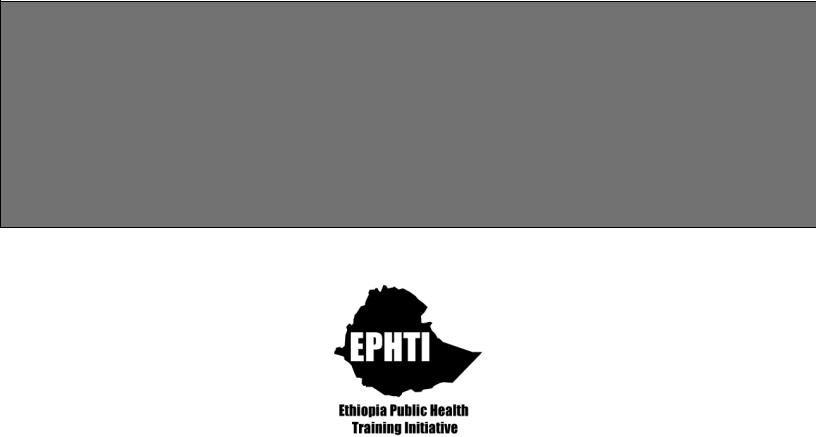
LECTURE NOTES
For Health Science Students
Introduction to
Public Health
Gebrezgi Gidey, M.D., M.Sc.
Sadik Taju, M.D.
Ato Seifu Hagos, B.Sc.
Mekelle University
In collaboration with the Ethiopia Public Health Training Initiative, The Carter Center, the Ethiopia Ministry of Health, and the Ethiopia Ministry of Education
2005

Funded under USAID Cooperative Agreement No. 663-A-00-00-0358-00.
Produced in collaboration with the Ethiopia Public Health Training Initiative, The Carter Center, the Ethiopia Ministry of Health, and the Ethiopia Ministry of Education.
Important Guidelines for Printing and Photocopying
Limited permission is granted free of charge to print or photocopy all pages of this publication for educational, not-for-profit use by health care workers, students or faculty. All copies must retain all author credits and copyright notices included in the original document. Under no circumstances is it permissible to sell or distribute on a commercial basis, or to claim authorship of, copies of material reproduced from this publication.
©2006 by Gebrezgi Gidey, Sadik Taju, Ato Seifu Hagos
All rights reserved. Except as expressly provided above, no part of this publication may be reproduced or transmitted in any form or by any means, electronic or mechanical, including photocopying, recording, or by any information storage and retrieval system, without written permission of the author or authors.
This material is intended for educational use only by practicing health care workers or students and faculty in a health care field.
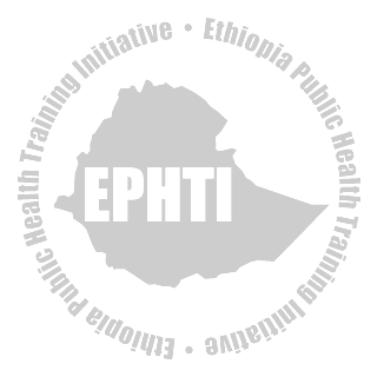
PREFACE
There is generally scarcity of teaching/ learning materials in the higher education institutions of Ethiopia. The available materials regarding the course on the Introduction to Public Health are not appropriate to our environmental and socio-economic set up.
This lecture note is prepared primarily for health officer students, and is organized based on the course outline of introduction to public health in the curriculum of health officers. Nevertheless, the lecture note is deemed to be useful for almost all degree and diploma health science students in the University and elsewhere in the country. Taking in to account the shortage of teaching /learning materials for the courseintroduction to public health, this lecture note is recommended to be used as a reference for students. Concepts, principles and terms are defined and described to reduce confusion.
This material is presented in ten chapters. Chapters - 1 and 2 present the definitions and various perspectives of health and public health and discusses the determinants of health. Chapters - 3, 4 and 5 deal with culture, traditional health care practice and family health. Chapter
i
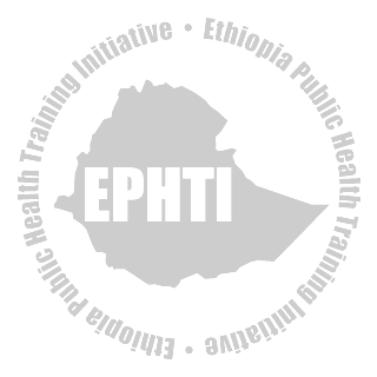
6 is about personal hygiene. Chapter 7 is about health and development. In this chapter the difference between development and economic growth, the role of health in development and health and development in the Ethiopian context are presented. Chapter 8 is about health service in Ethiopia and the history, the structure and the developments of the health service. Chapter 9 is about Primary Health Care and the definition, historical development, concepts and philosophies of Primary Health Care. Chapters 10 discusses community based health services and team approach in the health service. All chapters begin with learning objectives, by indicating what is expected from students on completion of the chapter. Furthermore, at the end of each chapter there are exercises related to the core issues of the respective chapter.
ii

ACKNOWLEDGMENTS
We would like to express our sincere thanks and appreciations to The Ethiopia Public Health Training Initiative (EPHTI), The Carter Center, for the financial and material support for the preparation of this lecture note
Our special thanks also go to Dr. Teweldeberhan Hailu, Mr. Awala Equar and Dr. Hagos Abraha, for their critical review and valuable contribution in the intra review process.
Our thanks as well go to the participants of the interreview process. Mr. Amsalu Feleke, Dr. Adamu Addissie and Mr. Tesfaye Gobenea contributed a lot of additional points and suggestions to this lecture note.
The authors extend their appreciation to Drs Ahmed Ali and Misganaw Fantahun for their highly professional editing and most helpful comments about many aspects of the text.
We are also grateful to Dr Hailu Yeneneh and Ato Aklilu Mulugeta for their guidance and encouragement and to Meseret Tsegaw, Mahlet Tilahun and Fekadu Tsege for the facilitation in the preparation process.
iii
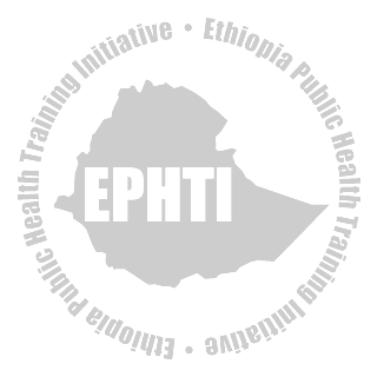
At last, but not least, we would like to extend our deep appreciations to the staff of the College Of Health Sciences, Mekelle University.
iv
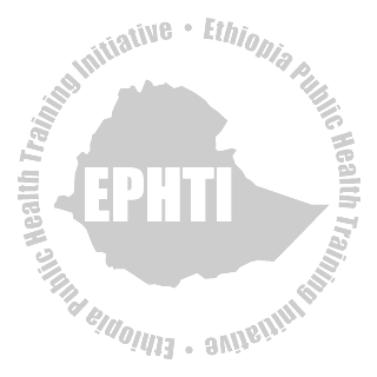
|
ABBREVIATIONS |
|
|
AIDS |
-Acquired Immuno Deficiency Syndrome |
|
|
ALERT |
-All Africa Leprosy Rehabilitation and |
||
|
Training Center |
|
|
ALRI |
- Acute Lower Respiratory Infection |
|
|
AURI |
- Acute Upper Respiratory Infection |
|
|
ANC |
- Antenatal Care |
|
|
ARI |
- Acute Respiratory Infection |
|
|
CHA |
- Community Health Agents |
|
|
CHC |
- Community Health Care |
|
|
CHW |
- Community Health Worker |
|
|
CIH |
-COMMUNITY |
INVOLVEMENT |
IN |
|
HEALTH |
|
|
CPHC |
- Comprehensive Primary Health Care |
|
|
DPT |
- Diphtheria Pertusis and Tetanus |
|
|
EPI |
- Expanded Program of Immunization |
|
|
FP |
- Family Planning |
|
|
GOBIFF |
-Growth monitoring, Oral rehydration, |
||
|
Breast-feeding, Immunization, Female |
||
|
education, Family Planning. |
|
|
HIV |
- Human Immuno Deficiency Virus |
|
|
HLS |
- Household Livelihood Security |
|
|
HSEP |
- Health Service Extension Package |
|
|
IEC |
- Information Education Communication |
|
|
v
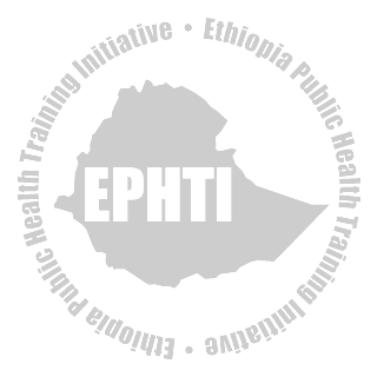
MCH |
- Maternal and Child Health |
MDG |
- Millennium Development Goal |
MOA |
- Ministry Of Agriculture |
MOE |
- Ministry Of Education |
MOH |
- Ministry of Health |
ORT |
- Oral Rehydration Therapy |
PHC |
- Primary Health Care |
PHCU |
- Primary Heath Care Unit |
RH |
- Reproductive Health |
SPHC |
- Selective Primary Health Care |
STD |
- Sexually Transmitted Disease |
STI |
- Sexually Transmitted Infection |
TB |
- Tuberculosis |
TBA |
- Traditional Birth Attendant |
TT |
- Tetanus Toxoid |
TTBA |
- Trained Traditional Birth Attendant |
UNICEF |
- United Nation Children’s Fund |
WHO |
- World Health Organization |
vi
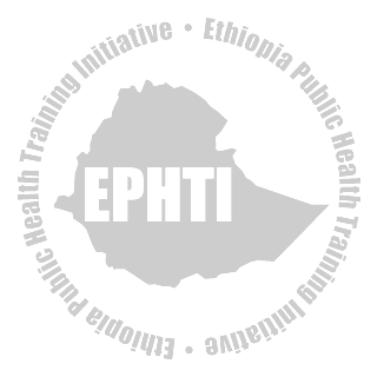
|
TABLE OF CONTENTS |
|
PREFACE .......................................................................... |
i |
|
ACKNOWLEDGMENT ..................................................... |
iii |
|
ABBREVIATIONS ............................................................ |
v |
|
CHAPTER ONE: CONCEPT OF HEALTH ....................... |
1 |
|
1.1 |
Objectives .............................................................. |
1 |
1.2 |
Health ..................................................................... |
1 |
1.3 |
Different perspectives on Health ............................ |
5 |
1.4 |
Determinants of Health .......................................... |
5 |
1.5 |
Globalization and Health ...................................... |
10 |
1.6 |
Model of Disease causation theories ................... |
12 |
1.7 |
Exercise ............................................................... |
18 |
CHAPTER TWO: PUBLIC HEALTH ............................... |
19 |
|
2.1 |
Learning Objectives ............................................. |
19 |
2.2 |
History of public health ......................................... |
19 |
2.3 |
Definition of public health ..................................... |
27 |
2.4 |
Major disciplines in public health ......................... |
32 |
2.8 |
Exercise ............................................................... |
39 |
CHAPTER THREE: HEALTH AND CULTURE ............... |
40 |
|
3.1 |
Learning Objectives ............................................. |
40 |
3.2 |
Definition .............................................................. |
40 |
vii

3.3 |
Relation of culture and health .............................. |
42 |
3.4 |
Exercise ............................................................... |
46 |
CHAPTER FOUR: TRADITIONAL HEALTH CARE |
||
|
PRACTICES ...................................... |
47 |
4.1 |
Learning Objectives ............................................. |
47 |
4.2 |
Introduction .......................................................... |
47 |
4.3 |
Structure of Traditional Medicine ......................... |
49 |
|
4.3.1 Ethno medical definition of Health ............... |
50 |
|
4.3.1.1 Naturalistic ethnologies:............................. |
52 |
|
4.3.1.2 Magico-religious domain ............................ |
53 |
4.4. Traditional Prenatal care ..................................... |
54 |
|
4.5. Secular Healing ................................................... |
57 |
|
|
4.5.1 Self care ...................................................... |
57 |
|
4.5.2 Empirical Practitioners ................................ |
58 |
4.6 |
Exercise ............................................................... |
60 |
CHAPTER FIVE: FAMILY HEALTH ............................... |
61 |
|
5.1 |
Learning Objectives .............................................. |
61 |
5.2 |
Family .................................................................. |
61 |
5.3 |
Family Health ....................................................... |
62 |
5.4 |
Exercise ............................................................... |
66 |
viii
